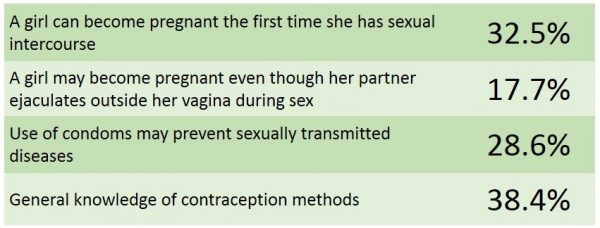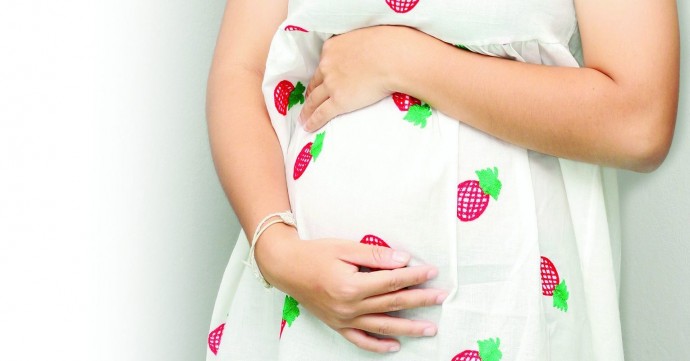“Adolescent pregnancy remains a major contributor to maternal and child mortality, and to intergenerational cycles of ill-health and poverty.” – World Health Organisation
Teenage pregnancy refers to any pregnancy in women or girls aged 19 years or younger. In 2016, the Ministry of Health recorded more than 12,000 teenage pregnancies in Malaysia. The National Registration Department reported that 4,992 children were born out of wedlock to girls aged 18 years and below. Teenage pregnancy is associated with immediate as well as long-term health risks.
It is also accompanied by a number of negative consequences that are detrimental to the well-being of young mothers – disruption of education, limitation of opportunities for self-development and employment, social stigma and increased exposure to violence and exploitation. This article examines some circumstances resulting in teenage pregnancy and explores ways to support teenagers who face difficulties resulting from unintended pregnancy.
Contributing factors
En Hairil Fadzly Md Akir, the Deputy Director-General of Policy for the National Population and Family Development Board (LPPKN) throws light on some of the findings which have emerged from the 5th Malaysian Population and Family Survey (MPFS-5), conducted by LPPKN in 2014. According to En Hairil, the survey revealed that there is a lack of awareness and knowledge about sexual and reproductive health among teenagers (see Table 1). The proportion of teenagers who are sexually active is small but gradually increasing. Among teenagers who are sexually active, ignorance results in the practice of unsafe sex that can have devastating consequences such as unintended pregnancy. The MPFS-5 revealed that 2.3% of teens between 13 and 17 had engaged in sexual intercourse, while findings from the National Health and Morbidity Survey in 2017 found that this percentage had risen to 7.3%.
Table 1: Knowledge of sexual intercourse among teens aged 13-17 years (Source: MPFS-5)
Trust does not ensure safety!
25% of youths in Malaysia believed that protection is not required, if there is mutual trust between partners.
(Source: Malaysian Youth Sexual and Reproductive Health Survey by Perspective Strategies, 2015)
Circumstances resulting in teenage pregnancy
Dr Mary Joseph Marret, a consultant paediatrician, explains that there are many different types of circumstances which could lead to teenage pregnancy. Some of these involve situations in which young girls may be forced into having sex with the use of violence. At times, they may agree to sexual activity without taking steps to prevent pregnancy because they are ignorant, unprepared or unable to ensure that their partner uses a condom. Teens with poor academic achievements and those who do not have close, supportive relationships with their own family are at higher risk of early sexual activity and unsafe sex. This occurs when they lose interest in school, form social relationships with other peers or older youth who do not attend school and participate in activities at venues without monitoring or regulation by responsible adults. Some teenage mothers are those who married at an early age, before they have a chance to complete their education and become independent adults.
Case illustrations of circumstances leading to teenage pregnancy
- *Julie was eighteen and studying in college far from her hometown. She met Sam, who helped her to forget that she was homesick and lonely. They made plans to get married after graduation. They became physically intimate, but Sam did not always use a condom. Neither of them planned or expected that Julie would become pregnant.
- No one knew that *Emma was pregnant until she was taken to hospital for severe abdominal pains and delivered a baby. She was only thirteen. Over the next few days she was quiet and withdrawn. Eventually, she opened up to a social worker who spoke to her kindly and revealed that her father had been raping her for the past year. He did not have a regular job, while her mother worked overtime to cover basic expenses.
- Fifteen – year – old *Liza hated school. Teachers scolded and criticised her non – stop. Classmates made fun of her. She was always behind in her assignments with no one in the family to help. Everyone was busy with the family business. Her parents usually returned home at 1.00am. They never noticed she sometimes skipped school and stayed out late. She liked to hang out with a group at the mall. One evening, a young man who gave her a ride home stopped by a park and forced her to have sex. He punched her once and threatened to leave her stranded if she refused. She never told anyone. After that incident, her never told anyone. After that incident, her period was delayed, and she discovered that she was pregnant.
- *Lina grew up in a remote village. She was second of nine children. She attended school until Standard 4. When she was eleven years old, her parents asked her to stay at home to look after her younger siblings. At fifteen, she was married in a traditional ceremony to a seventeen-year-old boy from the same village. A few months later, she was pregnant with her first child.
*Names are for illustration purposes and not in reference to any specific individual
Health concerns
According to Dr Marret, teenage mothers have a higher risk of complications during pregnancy and labour, as they are physically and biologically immature. Their babies may also have a higher risk of complications, including low birth weight or premature birth.
“Normally, mothers with high risk pregnancies should be more closely monitored and receive a higher standard of medical care throughout their pregnancy. Unfortunately, the opposite is true of most teenage mothers who are less likely to receive proper antenatal care, especially if they are unmarried. In many cases, families may be unaware of the early stages of pregnancy. The girls may not realise that they are pregnant or afraid to tell their parents. Societal prejudice against unwed mothers is also a barrier to attending antenatal check- ups. Even teenage mothers who are married may face difficulties accessing antenatal treatment due to a lack of education, inability to make decisions for themselves and financial dependence on their husbands and in-laws,” she added.
Under these circumstances, there is a higher risk that deliveries may take place outside a hospital or clinic, putting the lives of both the mother and child at risk. In some instances, a young mother who is alone and desperate may try to conceal the delivery and abandon the baby.
Expectant mothers of all ages need emotional and social support from family and friends, as their body undergoes changes related to pregnancy. Continued support is also crucial after delivery, especially for those prone to post-partum depression. Unwed teenage mothers may not receive this support if they are ostracised by their families. Even when families are supportive, girls may be sent to stay in shelter homes to safeguard their privacy. While this may protect them from inquisitive neighbours and unpleasant gossip, separation from their mothers and immediate family can cause these teens to feel alone, scared and isolated.
Looking for signs
Datuk Dr Zulkifli Ismail, a consultant paediatrician, said noticeable physical symptoms such as morning sickness, frequent vomiting, changes in appetite, increased fatigue, weight gain, as well as frequent urination are signs a teenager may be pregnant.
Other changes in her behaviour and appearance can also be a sign of pregnancy. A pregnant teen may be more moody and irritable than usual. She may also behave secretively and stay in her room more often than usual. She may start to prefer loose, bulky, or dark clothing, probably to hide her figure. However in some cases, pregnancy may not be recognised by the teenager herself or be missed by her family. This happens in those who have very mild or absent pregnancy symptoms, as well as those who have irregular periods or are overweight. A pregnancy test should always be done if there is doubt!
What should you do?

Dr Marret has the following advice: In general, the best way to assist a teenager who may be pregnant is to attend to her health needs, as well as ensuring her well- being and safety. Do not jump to conclusions or pass judgement. It is important to bear in mind that a teenager may not be responsible for the circumstances leading to pregnancy and may be experiencing severe psychological stress.
If your daughter informs you she is pregnant or you suspect that she may be pregnant, stay calm and assure her of your support. It is important for parents to be understanding and reassuring as these responses will make it easier for her to open up and share her problems.
Next, confirm the pregnancy. It is important to get a proper medical check-up to be sure, even if you have checked with a pregnancy test kit. Once confirmed, seek antenatal care as soon as possible. This is important to find out the stage of the pregnancy, as well as to ensure the well-being of the mother and baby. Consultation with a specialist is also necessary to seek advice for making decisions about the best way to deal with the pregnancy, depending on the stage and any medical complications.
If the case involves possible sexual abuse or rape, make a police report. Doctors can work together with the police and welfare services to address the safety and protection of girls who are sexually abused.
Make arrangements for your daughter to receive antenatal care until delivery. Discuss with her and decide whether it would be in her best interests to stay at home or move to a shelter home until her delivery. If she stays at a shelter home, ensure communication with supportive family members is maintained. Taking into consideration the family’s circumstances, discuss with her whether it would be best to keep the baby or give the baby up for adoption. Doctors can recommend welfare organisations that can help with the adoption process.
A teenager who has become pregnant as a result of sexual abuse can sometimes experience severe emotional and psychological distress. Seek professional advice from doctors to treat and support her. If continuing the pregnancy endangers her physical or mental health, an abortion can be carried out legally if she is willing. This should only be done by qualified specialists in a hospital setting to monitor her and handle complications such as severe bleeding or infection.
Seeking an abortion in an outpatient clinic by inexperienced doctors without proper training and back-up facilities places your child’s life at risk. It could result in serious injury to her womb that may interfere with child-bearing later on. A girl should never be forced to undergo an abortion against her will as this is a violation of her body, as well as detrimental to her immediate and long-term psychological well-being.
It is also important to provide your child with the necessary support to build her life for the future. Letting her know that you are concerned and want the best for her is important. She should receive information and counselling from doctors about how to prevent another unplanned pregnancy and avoid exposure to sexually transmitted diseases. Encourage her to complete her education. If she is not interested or cannot cope with school, look for opportunities for her to receive skills training according to her interests and talents.
Educate to prevent
Education plays a major role in preventing teenage pregnancies. En Hairil shared several government initiatives, such as the PEERS (Reproductive and Social Health Education) component in several subjects in school. “There is also KafeTEEN, a number of peer group centres for teenagers, which help them to practise positive lifestyle through teen talks and counselling services by professionals. LPPKN has also introduced PEKERTI modules in schools to educate and create awareness about social and reproductive health,” he added.
On the role of parents, Datuk Dr Zulkifli, as Chairman of Positive Parenting Management Committee, advised, “Parents are the best teachers to introduce this sensitive and intimate subject to their children. Start with simple lessons at a young age and continue in stages as they mature. If your children know that it is okay to discuss this topic with you, they are more likely to seek your help and advice when they encounter difficult or confusing situations.”
He explained, “Parents can start by teaching pre- schoolers the correct terms for their genitals and how to differentiate safe and bad touch. As they mature, explain that the physical changes to their bodies are a normal part of growing up. Teach them how to handle their feelings and interest in the opposite sex, emphasising the importance of mutual respect. Acknowledge their need to have supportive friends and encourage them to participate in healthy sports and social activities. Set clear boundaries for their behaviour towards others according to your cultural and religious values. Advise them how to avoid situations in which they may be pressured into sexual activity. Caution them that being in environments where alcohol and drugs are consumed increases this risk. Remind them that they have rights over their own bodies and the right to refuse any sexual request. Boys should be taught to respect women and their right to say “no”. They should be told that it is irresponsible and unacceptable if their actions cause a girl to become pregnant before marriage. They should also be reminded that sexual intercourse with a girl under sixteen years is illegal and could result in prosecution.”
Teenagers should be guided to seek proper advice regarding contraception to prevent pregnancy and sexually transmitted diseases. Girls should be advised about the importance of seeking help to receive immediate medical treatment to avoid pregnancy, if they have been sexually assaulted or exposed to unprotected sex.
Apart from education, being part of a caring, supportive family is also important in preventing risky sexual behaviour among teens. He stressed that families should build a close relationship with children from early childhood and continue to communicate with them in their teens, be involved in their lives, encourage them to develop their talents and build healthy relationships with their peers. To conclude, “Be attentive when they express difficulties or problems and help them to work out solutions. Remember that teens who feel supported by their families and are focused on educational and career goals are less likely to engage in sexual intimacy at an early age.”







Comments